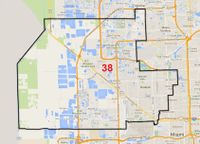Florida State Senate District 38
| Florida State Senate District 38 | ||
 | ||
| Current incumbent | Rene Garcia | |
| Population | 467,132 | |
| Race | 85.9% White, 7.9% Black, 0.1% Native American, 1.0% Asian, 0% Pacific Islander, 3.1% Some other race alone, 1.9% Two or More Races[1] | |
| Ethnicity | 7.4% Single-Race Non-Hispanic White, 5.9% Non-Hispanic Black, 2.5% Hispanic Black, 82.9% Hispanic, 1.3% Non-Hispanic Other | |
| Voting age | 78.4% age 18 and over | |
Florida's thirty-eighth state senate district is represented by Republican Senator Rene Garcia.
As of the 2010 census, a total of 467,132 civilians reside within Florida's thirty-eighth state senate district.[2] Florida state senators represent an average of 470,033 residents, as of the 2010 Census.[3] After the 2000 Census, each member represented 399,559 residents.[4]
About the office
Members of the Florida State Senate serve four-year terms with term limits. However, in the election following reapportionment, some senators are elected to two-year terms, in order to maintain staggered terms among the senators.[5] Florida legislators assume office on the day they are elected in the general election.
Qualifications
Article III, Section 15 of the Florida Constitution states: "Each legislator shall be at least twenty-one years of age, an elector and resident of the district from which elected and shall have resided in the state for a period of two years prior to election."[6]
Salaries
- See also: Comparison of state legislative salaries
| State legislative salaries, 2024[7] | |
|---|---|
| Salary | Per diem |
| $29,697/year | $175/day for a maximum of 60 days. Members can also receive per diem outside of the session. |
Term limits
- See also: State legislatures with term limits
The Florida legislature is one of 16 state legislatures with term limits. Voters enacted the Florida Term Limits Act in 1992. That initiative said that Florida senators are subject to term limits of no more than two four-year terms.
The first year that the term limits enacted in 1992 impacted the ability of incumbents to run for office was in 2000.[8]
Vacancies
If there is a vacancy in the Florida State Legislature, a special election must be called to fill the vacant seat.[9] The governor is responsible for calling the election and must consult with the secretary of state to set the election dates and nominating deadlines.[10] The person elected to fill the seat serves for the remainder of the unexpired term.[11]
![]() See sources: Florida Stat. § 100.101
See sources: Florida Stat. § 100.101
Elections
2014
- See also: Florida State Senate elections, 2014
Elections for the Florida State Senate took place in 2014. A primary election took place on August 26, 2014. The general election was held on November 4, 2014. The signature filing deadline for candidates wishing to run in this election was June 20, 2014. Incumbent Rene Garcia was unopposed in the Republican primary and was unchallenged in the general election.[12][13]
2012
- See also: Florida State Senate elections, 2012
Elections for the office of Florida State Senate consisted of a primary election on August 14, 2012, and a general election on November 6, 2012. The signature-filing deadline for candidates wishing to run in this election was June 8, 2012. Incumbent Rene Garcia (R) was unopposed in both the general election and Republican primary.[14][15][16]
Campaign contributions
From 2012 to 2012, candidates for Florida State Senate District 38 raised a total of $208,643. Candidates who raised money in contributions earned $208,643 on average. All figures come from Follow the Money.
| Campaign contributions, Florida State Senate District 38 | ||||
|---|---|---|---|---|
| Year | Amount | Candidates | Average | |
| 2012 | $208,643 | 1 | $208,643 | |
| Total | $208,643 | 1 | $208,643 | |
See also
External links
References
- ↑ For more information on the parameters the U.S. Census Bureau use, please see our Race and Ethnicity on the United States Census page.
- ↑ www.flsenate.gov/‘’ “Florida District Demographic Profile,” accessed November 5, 2013
- ↑ U.S. Census Bureau, "Population Distribution and Change: 2000 to 2010," accessed January 6, 2014
- ↑ U.S. Census Bureau, "States Ranked by Population: 2000," April 2, 2001
- ↑ Florida Senate Website Archive, "Florida Constitution," accessed December 16, 2013(referenced Article III, Section 15a)
- ↑ The Florida Senate, "Constitution of the State of Florida," accessed February 10, 2023
- ↑ National Conference of State Legislatures, "2024 Legislator Compensation," August 21, 2024
- ↑ Florida State Legisature, "Florida Constitution," accessed February 11. 2021
- ↑ Florida Legislature, "2023 Florida Statutes," accessed January 23, 2024 (Statute 100.101(2), Florida Election Code)
- ↑ Florida Legislature, "2023 Florida Statutes," accessed January 23, 2024 (Statute 100.141 (1) (2), Florida Election Code)
- ↑ Florida Legislature, "2023 Florida Statutes," accessed January 23, 2024 (Statute 100.111 (1) (a-c), Florida Election Code)
- ↑ Florida Division of Elections, "2014 Florida Election Watch - Multi-County or District Offices," accessed September 3, 2014
- ↑ Florida Division of Elections, "Candidate Listing for 2014 General Election," accessed June 23, 2014
- ↑ Florida Division of Elections, "Official 2012 General Election Results," accessed December 6, 2013
- ↑ Florida Division of Elections, "Candidate list," accessed December 6, 2013
- ↑ Florida Division of Elections, “2012 Primary results,” accessed December 6, 2013


